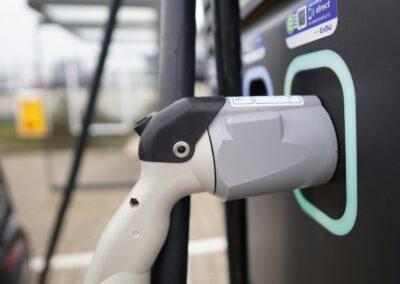Understanding Smart Grids
Smart grids are advanced electrical grids that use digital communication technology to detect and react to local changes in usage, improving the efficiency, reliability, and sustainability of electricity distribution. In the dynamic business environments of Saudi Arabia and the UAE, smart grids are becoming essential for meeting the growing demand for energy while ensuring environmental sustainability.
In Riyadh and Dubai, the implementation of smart grids is revolutionizing the way electricity is generated, distributed, and consumed. These grids enable real-time monitoring and management of electricity flows, allowing for more accurate demand forecasting and load balancing. This capability is particularly important in regions where energy consumption patterns are highly variable, ensuring a stable and reliable power supply.
Innovative Applications in Energy Management
The applications of smart grids in energy management are vast and transformative. One of the key benefits is their ability to enhance grid resilience and reliability. By continuously monitoring grid conditions and automatically detecting and isolating faults, smart grids minimize the impact of outages and improve overall grid performance. In cities like Riyadh and Dubai, where uninterrupted power supply is crucial for economic activities, this capability is invaluable.
In addition to improving grid reliability, smart grids enable more efficient energy use through demand response programs. These programs incentivize consumers to reduce or shift their electricity usage during peak demand periods, helping to balance supply and demand. By leveraging advanced metering infrastructure and real-time data analytics, smart grids provide consumers with detailed information about their energy consumption patterns, empowering them to make informed decisions and reduce their energy costs.
Enhancing Energy Distribution Through Smart Grids
Effective energy distribution is critical for maximizing the value and performance of energy infrastructure. Smart grids provide a powerful tool for achieving this goal by offering a comprehensive view of grid operations and enabling more efficient distribution of electricity. In Saudi Arabia and the UAE, where large-scale infrastructure projects are commonplace, smart grids are playing a key role in enhancing energy distribution practices.
One of the primary benefits of smart grids in energy distribution is their ability to optimize the flow of electricity based on real-time data. By continuously analyzing grid conditions and adjusting the distribution of electricity accordingly, smart grids ensure that power is delivered where and when it is needed most. This dynamic management of electricity flows reduces transmission losses and improves the overall efficiency of the energy system.
Leadership and Change Management in the Transition to Smart Grids
The successful implementation of smart grids requires effective leadership and change management. In Saudi Arabia and the UAE, executive coaching services are essential in helping leaders navigate the complexities of digital transformation in the energy sector. These services focus on developing the skills needed to lead technological innovation, including strategic thinking, effective communication, and change management.
Effective communication is crucial in managing the transition to smart grid technology. Leaders must articulate the benefits of smart grids to their teams and stakeholders, fostering a culture of innovation and continuous improvement. In Riyadh and Dubai, management consulting firms are providing tailored strategies to help businesses communicate the advantages of smart grid technology effectively. These strategies include training programs that equip employees with the knowledge and skills to work with smart grid technologies seamlessly.
Moreover, change management strategies are vital for fostering a culture of innovation and adaptability. Leaders must create an environment where experimentation and continuous improvement are encouraged. This approach is aligned with the UAE’s Vision 2021 and Saudi Arabia’s Vision 2030, both of which emphasize the importance of innovation and digital transformation in driving economic growth. By embracing smart grid technology and fostering a culture of innovation, businesses in these regions can enhance their operational capabilities and achieve sustained success.
#SmartGrids #EnergyManagement #EnergyDistribution #AITechnology #DigitalTransformation #SaudiArabia #UAE #Riyadh #Dubai























